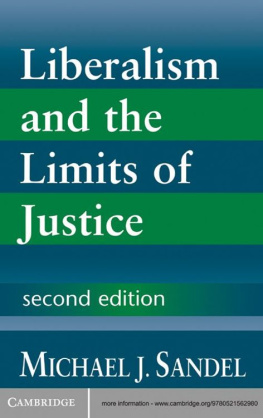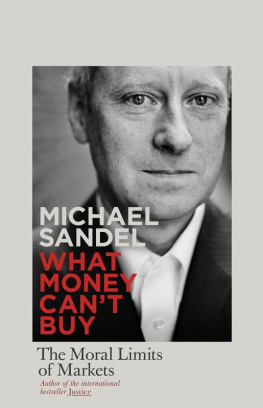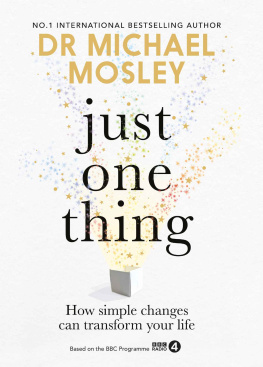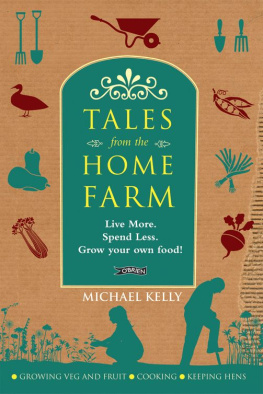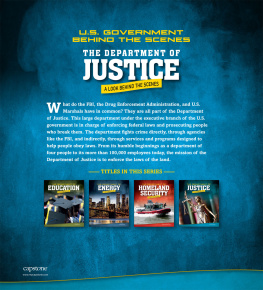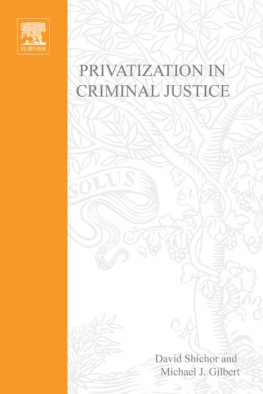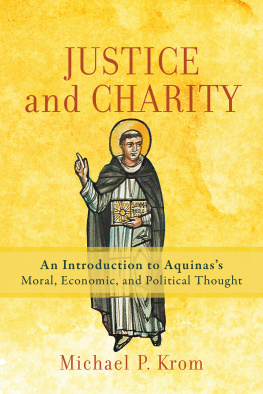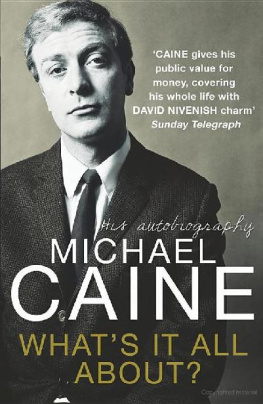Michael J. Sandel - Justice: Whats the Right Thing to Do?
Here you can read online Michael J. Sandel - Justice: Whats the Right Thing to Do? full text of the book (entire story) in english for free. Download pdf and epub, get meaning, cover and reviews about this ebook. year: 2009, publisher: Allen Lane, genre: Politics. Description of the work, (preface) as well as reviews are available. Best literature library LitArk.com created for fans of good reading and offers a wide selection of genres:
Romance novel
Science fiction
Adventure
Detective
Science
History
Home and family
Prose
Art
Politics
Computer
Non-fiction
Religion
Business
Children
Humor
Choose a favorite category and find really read worthwhile books. Enjoy immersion in the world of imagination, feel the emotions of the characters or learn something new for yourself, make an fascinating discovery.

- Book:Justice: Whats the Right Thing to Do?
- Author:
- Publisher:Allen Lane
- Genre:
- Year:2009
- Rating:3 / 5
- Favourites:Add to favourites
- Your mark:
- 60
- 1
- 2
- 3
- 4
- 5
Justice: Whats the Right Thing to Do?: summary, description and annotation
We offer to read an annotation, description, summary or preface (depends on what the author of the book "Justice: Whats the Right Thing to Do?" wrote himself). If you haven't found the necessary information about the book — write in the comments, we will try to find it.
Justice: Whats the Right Thing to Do? — read online for free the complete book (whole text) full work
Below is the text of the book, divided by pages. System saving the place of the last page read, allows you to conveniently read the book "Justice: Whats the Right Thing to Do?" online for free, without having to search again every time where you left off. Put a bookmark, and you can go to the page where you finished reading at any time.
Font size:
Interval:
Bookmark:
Liberalism and the Limits of Justice (1982; 2nd ed., 1998)
Liberalism and Its Critics, editor (1984)
Democracys Discontent: America in Search of a Public Philosophy (1996)
Public Philosophy: Essays on Morality in Politics (2005)
The Case Against Perfection: Ethics in the Age of Genetic Engineering (2007)
Justice: A Reader, editor (2007)
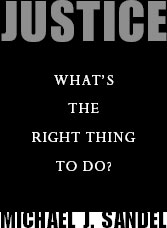

ALLEN LANE
an imprint of
PENGUIN BOOKS
ALLEN LANE
Published by the Penguin Group
Penguin Books Ltd, 80 Strand, London WC2R 0RL, England
Penguin Group (USA) Inc., 375 Hudson Street, New York, New York 10014, USA
Penguin Group (Canada), 90 Eglinton Avenue East, Suite 700, Toronto, Ontario, Canada M4P 2Y3
(a division of Pearson Penguin Canada Inc.)
Penguin Ireland, 25 St Stephens Green, Dublin 2, Ireland (a division of Penguin Books Ltd)
Penguin Group (Australia), 250 Camberwell Road, Camberwell, Victoria 3124, Australia
(a division of Pearson Australia Group Pty Ltd)
Penguin Books India Pvt Ltd, 11 Community Centre, Panchsheel Park, New Delhi 110 017, India
Penguin Group (NZ), 67 Apollo Drive, Rosedale, North Shore 0632, New Zealand (a division of Pearson New Zealand Ltd)
Penguin Books (South Africa) (Pty) Ltd, 24 Sturdee Avenue, Rosebank, Johannesburg 2196, South Africa
Penguin Books Ltd, Registered Offices: 80 Strand, London WC2R 0RL, England
www.penguin.com
First published in the United States of America by Farrar, Straus and Giroux 2009
First published in Great Britain by Allen Lane 2009
Copyright Michael J. Sandel, 2009
The moral right of the author has been asserted
All rights reserved
Without limiting the rights under copyright reserved above, no part of this publication may be reproduced, stored in or introduced into a retrieval system, or transmitted, in any form or by any means (electronic, mechanical, photocopying, recording or otherwise), without the prior written permission of both the copyright owner and the above publisher of this book
A CIP catalogue record for this book is available from the British Library
ISBN: 978-1-84-614280-2
For Kiku, with love
In the summer of 2004, Hurricane Charley roared out of the Gulf of Mexico and swept across Florida to the Atlantic Ocean. The storm claimed twenty-two lives and caused $11 billion in damage. It also left in its wake a debate about price gouging.
At a gas station in Orlando, they were selling two-dollar bags of ice for ten dollars. Lacking power for refrigerators or air-conditioning in the middle of August, many people had little choice but to pay up. Downed trees heightened demand for chain saws and roof repairs. Contractors offered to clear two trees off a homeowners rooffor $23,000. Stores that normally sold small household generators for $250 were now asking $2,000. A seventy-seven-year-old woman fleeing the hurricane with her elderly husband and handicapped daughter was charged $160 per night for a motel room that normally goes for $40.
Many Floridians were angered by the inflated prices. After Storm Come the Vultures, read a headline in USA Today. One resident, told it would cost $10,500 to remove a fallen tree from his roof, said it was wrong for people to try to capitalize on other peoples hardship and misery. Charlie Crist, the states attorney general, agreed: It is astounding to me, the level of greed that someone must have in their soul to be willing to take advantage of someone suffering in the wake of a hurricane.
Florida has a law against price gouging, and in the aftermath of the hurricane, the attorney generals office received more than two thousand complaints. Some led to successful lawsuits. A Days Inn in West Palm Beach had to pay $70,000 in penalties and restitution for overcharging customers.
But even as Crist set about enforcing the price-gouging law, some economists argued that the lawand the public outragewere misconceived. In medieval times, philosophers and theologians believed that the exchange of goods should be governed by a just price, determined by tradition or the intrinsic value of things. But in market societies, the economists observed, prices are set by supply and demand. There is no such thing as a just price.
Thomas Sowell, a free-market economist, called price gouging an emotionally powerful but economically meaningless expression that most economists pay no attention to, because it seems too confused to bother with. Writing in the Tampa Tribune, Sowell sought to explain how price gouging helps Floridians. Charges of price gouging arise when prices are significantly higher than what people have been used to, Sowell wrote. But the price levels that you happen to be used to are not morally sacrosanct. They are no more special or fair than other prices that market conditionsincluding those prompted by a hurricanemay bring about.
Higher prices for ice, bottled water, roof repairs, generators, and motel rooms have the advantage, Sowell argued, of limiting the use of such things by consumers and increasing incentives for suppliers in far-off places to provide the goods and services most needed in the hurricanes aftermath. If ice fetches ten dollars a bag when Floridians are facing power outages in the August heat, ice manufacturers will find it worth their while to produce and ship more of it. There is nothing unjust about these prices, Sowell explained; they simply reflect the value that buyers and sellers choose to place on the things they exchange.
Jeff Jacoby, a pro-market commentator writing in the Boston Globe, argued against price-gouging laws on similar grounds: It isnt gouging to charge what the market will bear. It isnt greedy or brazen. Its how goods and services get allocated in a free society. Jacoby acknowledged that the price spikes are infuriating, especially to someone whose life has just been thrown into turmoil by a deadly storm. But public anger is no justification for interfering with the free market. By providing incentives for suppliers to produce more of the needed goods, the seemingly exorbitant prices do far more good than harm. His conclusion: Demonizing vendors wont speed Floridas recovery. Letting them go about their business will.
Attorney General Crist (a Republican who would later be elected governor of Florida) published an op-ed piece in the Tampa paper defending the law against price gouging: In times of emergency, government cannot remain on the sidelines while people are charged unconscionable prices as they flee for their lives or seek the basic commodities for their families after a hurricane. Crist rejected the notion that these unconscionable prices reflected a truly free exchange:
This is not the normal free market situation where willing buyers freely elect to enter into the marketplace and meet willing sellers, where a price is agreed upon based on supply and demand. In an emergency, buyers under duress have no freedom. Their purchases of necessities like safe lodging are forced.
The debate about price gouging that arose in the aftermath of Hurricane Charley raises hard questions of morality and law: Is it wrong for sellers of goods and services to take advantage of a natural disaster by charging whatever the market will bear? If so, what, if anything, should the law do about it? Should the state prohibit price gouging, even if doing so interferes with the freedom of buyers and sellers to make whatever deals they choose?
Next pageFont size:
Interval:
Bookmark:
Similar books «Justice: Whats the Right Thing to Do?»
Look at similar books to Justice: Whats the Right Thing to Do?. We have selected literature similar in name and meaning in the hope of providing readers with more options to find new, interesting, not yet read works.
Discussion, reviews of the book Justice: Whats the Right Thing to Do? and just readers' own opinions. Leave your comments, write what you think about the work, its meaning or the main characters. Specify what exactly you liked and what you didn't like, and why you think so.

